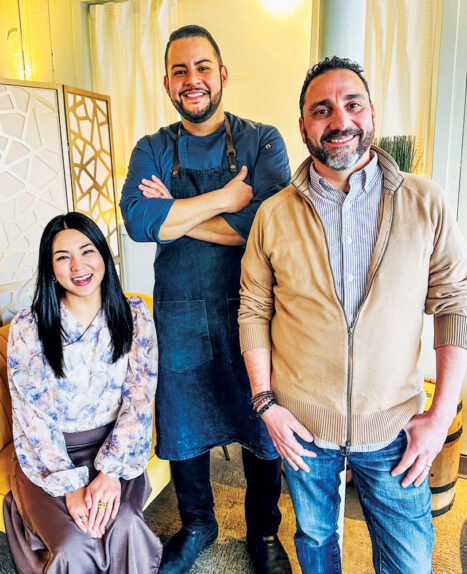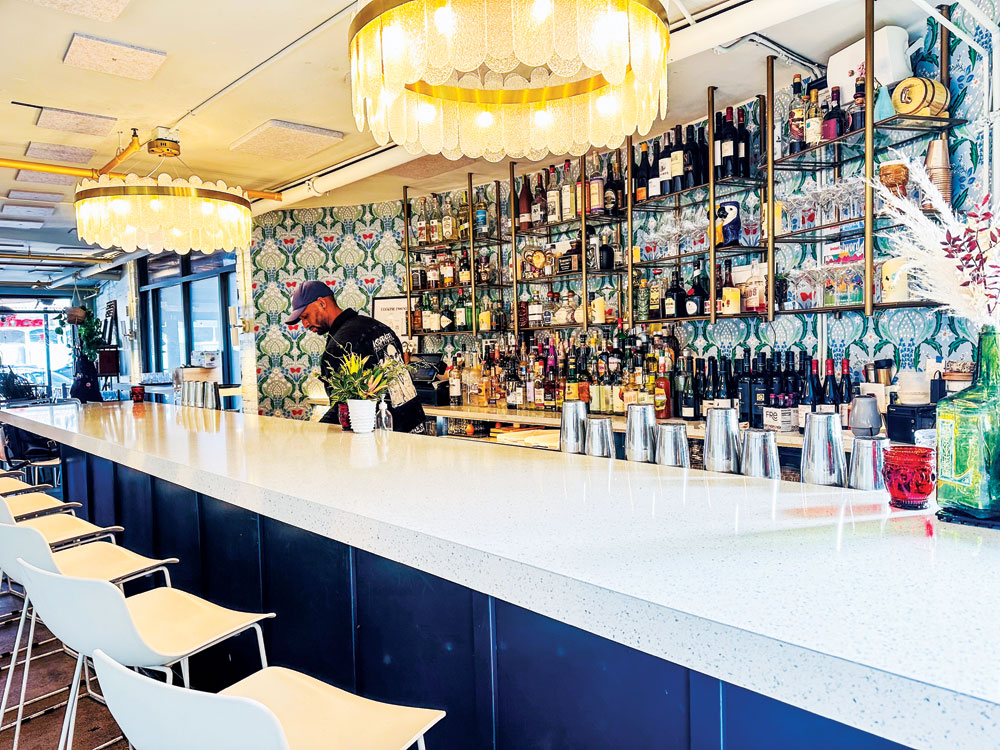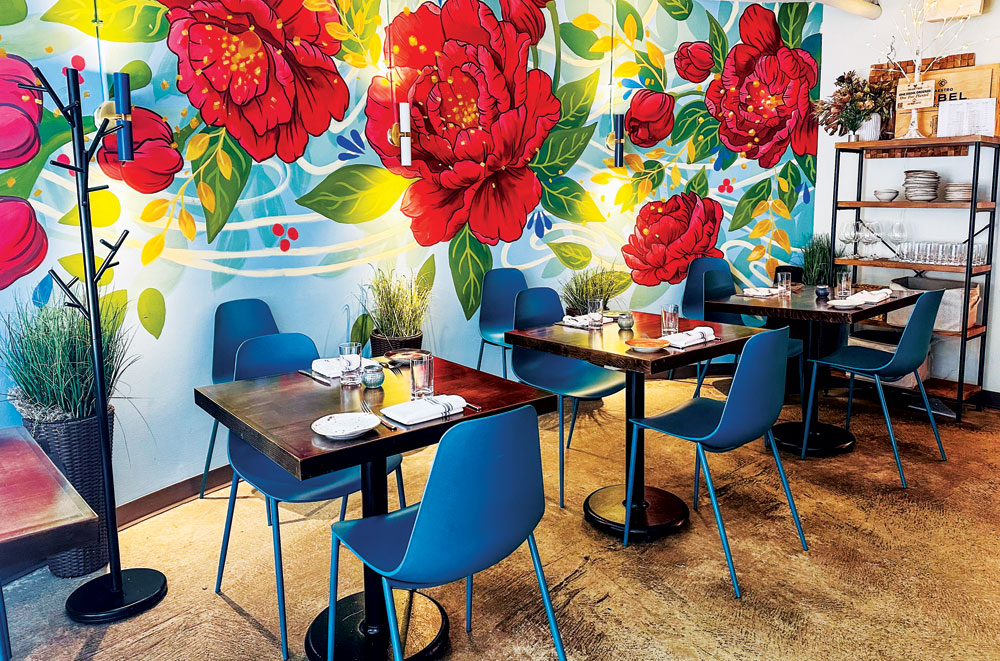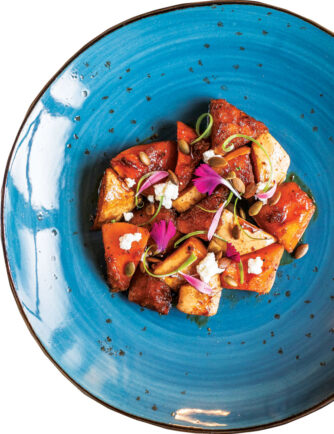
Michelle Nguyen, operations manager, and chefs Erasmo (Ras) Casiano and Diego Coconati, own Lucina Eatery & Bar in Park Hill. Communication, creativity, and storytelling are key to the trio and staff. Front Porch photo by Christie Gosch
For Erasmo (Ras) Casiano and Diego Coconati, owners of Lucina Eatery & Bar, the goal is to have diners leave happier than they came in. To do that, they put a premium on nurturing an attentive staff and serving food that is about more than just something to eat: it’s about valuing the rich culinary cultures they grew up with.
Although the Park Hill restaurant has been wildly popular since it opened in 2022, the chefs were caught off guard last month when they learned they were semi-finalists for the prestigious James Beard Foundation award for Best Chef: Mountain (CO, ID, MT, UT, WY). Coconati thought such an accomplishment was unreachable. “I’ve been cooking for 27 years. I thought (a James Beard award) was for a different level of chef—something you look at and think ‘It would be nice but impossible to be in that group,’” he says. “We need to make sure it wasn’t a fluke and that we keep doing what we’ve been doing. It’s pressure on us but it’s great pressure.”
Coconati, who grew up in Buenos Aires, Venezuela and Puerto Rico, and Casiano, a first generation Mexican American, met while in culinary school. In 2018, they started Create Cooking School that offered in-home dinners and catering, and then opened a physical space at Stanley Marketplace. (They recently rebranded as Create Kitchen & Bar to acknowledge the popular neighborhood bar side of the space and clarify that the school is for home cooks, not pros.) During the pandemic, the team offered virtual cooking classes and pop-up restaurant events, serving Italian, French, and Southern cuisine.

Having a neighborhood restaurant was a goal—to create a space where Lucina Eatery & Bar could gain a regular following, where guests and staff would look forward to seeing each other. Front Porch photo by Christie Gosch
“One day, we did Latin American food, motivated by the food that we grew up with like tamales and pupusas, and wondered why there wasn’t a restaurant that had all of this,” says Casiano. “I always wanted a neighborhood spot because you have people who are always in the area that you get to know. If our doors are open and we’re hospitable, we’ll gain our own following because we want to see them and they want to see us.”
They opened Lucina, named after Casiano’s mother, and began serving Latin American food with Spanish influences, drawing from Indigenous foods and those that came after Columbus, paying respect to each different culture. Dishes include pozole, empanadas, ceviche, mussels with chorizo, and paella on Fridays and Saturdays.

A colorful wall mural is an example of décor reflecting Lucina’s owners’ mission to celebrate vibrant culinary cultures of Latin-American countries with Spanish influences, drawing on Indigenous traditions and post-Columbus adaptations. Front Porch photo by Christie Gosch
Despite Coconati and Casiano both being chefs, the proverbial “too many cooks in the kitchen” isn’t an issue. “We like to play around with making new flavors,” says Coconati. “We do some research and do a dish from a specific country to show the respect to those ingredients. It’s about completing a story of the dish, what country it comes from or why they do it that way.”
Michelle Nguyen, who had been the first employee at the cooking school, now serves as operations manager for both Create and Lucina and is a co-owner of Lucina. The trio is now busy planning to open a third establishment called Xiquita in Uptown in late spring or early summer. Xiquita is a play on the word “chiquita,” which is Casiano’s father’s term of endearment for his wife, Lucina. The restaurant will feature cuisine from various parts of Mexico, including Mexico City, Sonora, Oaxaca, and the Yucatan.

Verduras, a popular menu item at Lucina, is a lively mixture of pumpkin in a sweet and spicy glaze topped with cheese and pumpkin seeds. Photo courtesy of Casey Wilson
Calling it a deep dive into his culture, Casiano says guests will see someone making masa and housemade tortillas to order and will smell the influences of Mexico. “There are countless opportunities for dishes because our dining populace hasn’t explored all of it yet and, honestly, as chefs, neither have we,” he says.
Coconati feels Xiquita is a good move for the business, saying it’s important to “ride the wave.” “People like what we’re doing so I think now is a good time to keep the momentum going.”
Part of the team’s confidence in opening a new restaurant is due to the interest and loyalty from their staff. “We have continuous check-ins with our team asking what they want from us and telling them there’s a path to more if they’re interested,” says Nguyen, who offers a unique perspective, having been an employee before becoming an owner. “Ras and Diego have always kept me in conversations of what they were thinking.”
Conversations and storytelling are key to the team. “We don’t know a people or culture until we’ve sat around the dinner table with them,” says Casiano. He sees the restaurant dining table as an extension of that. “We want people to be curious and ask ‘Where does this come from?’” says Casiano. “These are questions we love hearing and our staff is good at relaying the stories we’ve told them. And they tell their own, personal stories about the dish too. Food is storytelling. It ties the entire world together.”




0 Comments